We Found Pirates at the Consumer Electronics Show

Have you ever wondered how technology gets pirated? Even if you've never traveled, you're probably aware of things like knockoff iPhones or fake G-Spot Vibrotron 5000s. You might even have heard about websites like Alibaba.com, which is basically one big digital market for stolen ideas. They had to de-list 114 million items in the first nine months of 2013 alone for copyright violations. And that's just a drop in the bucket. Over in China, you can find entire unlicensed "Apple" stores selling fake products.
If you're like me, you probably assumed these knockoffs were all reverse-engineered from the original products and then churned out by some shyster factory. But how it actually gets done is much more ridiculous, much more infuriating, and -- sometimes -- much more Vegas:
Spies Attend Trade Shows Just to Steal Ideas

The Consumer Electronics Show is one of the world's largest trade shows. Picture Comic Con, but with less cosplay and an actual coherent theme. It's held every year in Las Vegas, and it gives tech companies huge and startup alike a chance to show off their next year's worth of gadgets. Many of them take this opportunity to put review units in the hands of retailers and journalists. Also attending are hundreds and hundreds of tiny Chinese manufacturers, most with names you wouldn't recognize. Many of them take this opportunity to put review units in the hands of retailers and journalists. Also attending are hundreds of Chinese spies.

"No matter how many Greek women I must bed, I will discover the secret of Amazonian fire."
It makes a lot of sense when you think about it: CES is full of unreleased gadgets, still waiting on FCC approval, passing their final few safety tests, etc. But China is the Wild West for technology, and manufacturers there don't have to worry as much about, say, whether their new smartphone charger might electrocute people to death. If they can find and copy a great idea at CES, they can have their knockoff on the market before the original even launches.
I first picked up on this at the booth for a company named Onanoff. The company owner, Petur Olafsson, was giving me his standard product pitch when a Chinese man with a camera crept up to the booth and started taking very close-up photos of a speaker case Petur designed for the iPad Air.
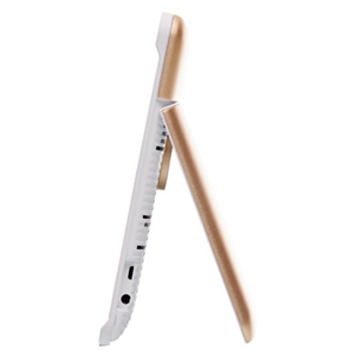
"Blasphemy! If your iPad was meant to have a kickstand, God -- er, Steve Jobs would have put one on it!"
Petur got pissed, and shooed this iPhone-wielding James Bond away. He explained that this was not an isolated incident. Similar men had been coming up to his booth all trade-show long, taking detailed pictures and then scampering off, like some kind of weird electronics-based sexual predators. Their badges identified them as "Exhibitors" and not "Press," and none of them ever asked him questions about his mechanical baby. It was clear to Petur that they meant to steal his brainchild.
"You put three years of your life into a product, and they rip you off."

While you studied engineering, like a dipshit.
This set the Journalism Lobe of my brain a-tinglin', something that doesn't generally happen without a pint of hard liquor or a good solid ether binge. My camerawoman/fiance Magenta in tow, I set off down the little strip of booths nearest to the convention hall designated for Chinese exhibitors. My goal was to find anyone else who'd had a product abducted at CES.
It took about two minutes.
You Might Wind Up Competing With Your Own Stolen Products
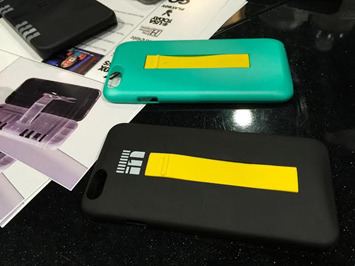
That thing on the bottom is the IN1CASE Juice Case. The thing above it is the same case, but made using shittier materials and sold at CES just a building away from the people who own the actual copyright. An eagle-eyed fan pointed this out to them and they went down and bought a copy. Their one consolation is that it was made with way cheaper, shittier materials than the original -- and that it cost only $5. Which is like saying, "Man, this baking soda was soooo much cheaper than the cocaine you paid for!"
But hey! At least ripping off an original product with a poorly-constructed knockoff is a time-honored capitalist tradition. If that's all I'd found, you wouldn't be reading this article. Fortunately for my ability to stay employed, things quickly got much, much weirder.
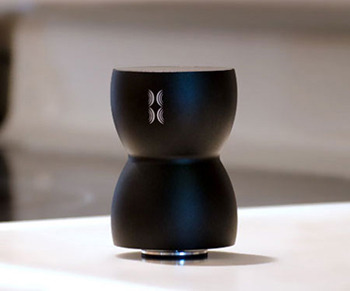
You are now craving soft-boiled eggs.
This is the Bass Egg. It's a nifty little gadget that turns any table or wall you set it on into a massive speaker, allowing you to carry around a lot of potential sound in a very portable package. I call it "The Library Ruiner." I met pne of the engineers behind it, got a review sample, exchanged business cards, and walked away impressed. I've seen a lot of pitches for a soul-aching number of different gadgets in my career, and most of them stand out about as much as a white dude in Portland. The Bass Egg was unique, which is why it surprised me when literally ten minutes later Magenta spotted one sitting on the shelf of Shenzhen-based trading company, Potranda's booth. It was seated on a shelf full of other (presumed) knockoffs, less than a quarter of a mile away from the actual Bass Egg's booth.
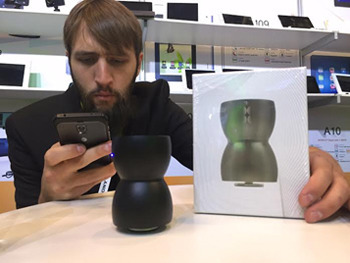
When you crack it open, all the circuits have evil goatees.
Portranda's employees -- none of whom spoke English -- had no answer for me when I asked what the hell was going on there. This was no cheap replica. It appeared to be the exact same product, sans branding, on sale a few hundred feet away from one of the Bass Egg engineers, Zaki Moustafa. He was incredibly surprised when I told him:
"This is crazy ... we manufacture overseas, but isn't our manufacturer."
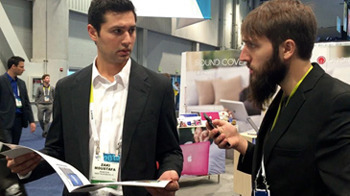
Here's him looking over their brochure.
Unfortunately, he did not flip out and start spin-kicking dudes in the neck, but sometimes my dreams overpower my sense of reality. So how the hell did this happen? As we learned ...
Pictures Are Enough for an Exact Rip-Off

No one at the booth for the Shenzhen-based company selling the rip-off Bass Egg knew how to make it work. I actually had to show them how to set the product up and get it playing music. Which, now that I think about it, kind of makes me an asshole for helping them.
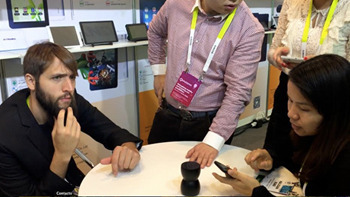
Two smartphones and three people weren't enough for them to figure it out.
But -- on the outside -- it looked and felt like a perfect copy. If so, it would've meant that something fishy was going on with the manufacturer Bass Egg used over in China.
"... this kind of thing occurs ALL the time in the world of overseas manufacturing. So-and-so's uncle owns the factory down the road, and he's got extra inventory of such-and-such product -- he may not be allowed to share it, but he's not going to let it go to waste, right?"
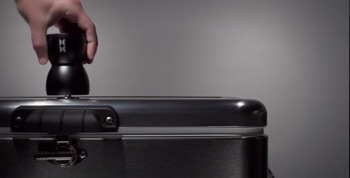
Maybe no one told them that they weren't actual eggs and were in no danger of going bad?
But Zaki performed an autopsy on the counterfeiter's Bass Egg after the trade show, and discovered that whoever ripped him off had only gotten the outside perfect. His manufacturer was innocent. The inside was all junk -- it was like they'd taken a '69 Charger and shoved a lawnmower engine under the hood:
"They took literally every option to cut corners. For example, placing the Bluetooth module on the amplifier board (rather than keeping separate) so that they would have to use less injection-molded PCB holders. Now, since they put the Bluetooth module on the amplifier board (which is located at the same level that all the buttons are) they have the antenna (which receives the signal containing music or whatever from your phone) too far away from the top of the Bass Egg. To get around this, they literally soldered a piece of wire from the Bluetooth antenna and stuck it to the underside of the top cap with a piece of 3M tape."
Here's a picture I took of Potranda's Bass Egg of Lies next to the real Bass Egg:
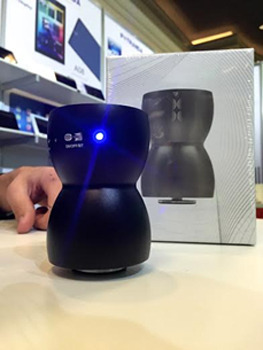
Do not believe his blue light special of deception.
How could it look so perfect? Potranda had succeeded in making a picture-perfect replica, one so convincing that a man who was an actual Bass Egg engineer believed in its legitimacy at first glance. At first, I assumed this meant Bass Egg had fallen victim to the Michael Jordan of rippin' shit off. But the truth is that trade shows like CES are like a big red Easy button for corporate espionage:
"I'm new to the world of tech trade shows, but I was shocked at the number of people who wanted to approach the booth and document every angle of the product (as well as our product commercials) in high res photos and HD video. There is absolutely nothing stopping these guys from playing the role of 'interested customer' and walking away with their very own Bass Egg to take apart and recreate using their own factories and engineers."
"Fortunately for us", stated Bass Egg CEO, Jonathan Bouchlas, "we have just recently received our patent approval and will be able to begin taking action against counterfeiters such as this. Not all companies of our size have this luxury".
I also spoke with the Operation's Manager of Ogio, a company that makes durable backpacks for people who like to own expensive electronics and crash motorcycles. He pointed out that his company had people specifically hired to police their manufacturers, auditing to make sure no "extra" bags were shipped anywhere else. Even though the number of actual stolen and resold Ogio bags was low, there was nothing to stop Alibaba.com from selling pages worth of cheap replicas:
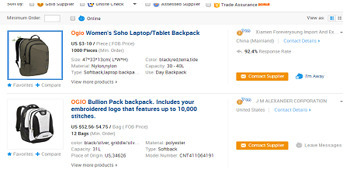
Not pictured above: any actual Ogio products.
It's an infuriating problem, and you should be pissed about it even if you're the sort of person who steals all their TV and movies online. Pirating media is one thing. Faking a product, and then attempting to profit from it yards away from the inventor is another. Unfortunately ...
There's No Way to Stop It

Piracy is personal for Zaki Moustafa. He is part of a team who built something weird and unique, and he even went to the trouble of shooting it with a shotgun to prove how awesome it was:
A surprising number of companies market to the "dangerously unhinged gun owner" demographic.
Now someone was watering that neat, inexplicably shotgun-resistant idea down and churning out nigh-identical fakes. And Bass Egg can be sure that any new product they make will be captured and shit-chameleonized in just the same manner:
"The regulations are so loose, there's not much one can do without a registered patent."

Seriously, just one spin kick. I'll pay your bail.
And there's not necessarily much companies can do WITH a registered patent. While China has similar copyright laws to most major countries, they enforce those laws about as often as your college lowers its tuition rates. (It's estimated that effectively dealing with piracy in China would add nearly 1 million jobs to the US economy and 21 million jobs to China's.) Even at CES, in the beating colon of American capitalism, no steps were being taken to push out the pirates or stop them from selling pirated products in the same convention center as their inventors.
"It's not their job," said Ogio's rep, adding, "I wish they could."

Vigilante squads just aren't in the budget.
CES is too large to fully regulate -- or to keep out the spies. And if China were the kind of country that rigorously enforced their copyright laws, they might start rigorously enforcing labor laws. Things like fair wages and sane limitations to working hours would drive up the cost of gadgets, and then we wouldn't be able to afford a new smartphone/tablet/laptop every two years. So piracy is just accepted as the cost of doing big business.
And as for the smaller companies who come in with kooky little ideas and try their best to innovate? They'll have to accept that no number of patents can fully protect them against a man with a camera on his phone.
Robert Evans tweets on his twatter, follow him here.
For more from Robert Evans, check out 4 Reasons 'Star Wars' Is Better Than 'Star Trek' and 5 World-Changing Trends That Will Transform Pop Culture.
Are you on reddit? Check it: We are too! Click on over to our best of Cracked subreddit.
